Whatever else it is — and it is many things — Quentin Tarantino’s The Hateful Eight is an event. I am not referring to the arrogance of the “roadshow” version and all the hoo-hah over seeing it in 70mm. No. Those are gimmicks that ultimately have about as much meaning as putting parsley on fish. I’m talking about the film itself. With most movies that come our way, you go to see them, you enjoy them or not, you go outside afterwards and just return to normal. Two or three times a year — if you’re very lucky — something special comes along that leaves you with a different feeling. The Hateful Eight is such a film. Love it or hate it, you leave the theater feeling you’ve really seen something. It won’t allow you to shrug and just go back to normal. Why? Perhaps because it’s not a normal movie. Truth is, it’s not even a normal Tarantino movie.
And yet it is a Tarantino movie every inch of the way — possibly his best. It’s long — maybe longer than it needs to be. Some will be put off by the relative slowness of its first half. It’s talky with people tending to go off on speechified arias of often astonishing profanity. It’s violent and bloody and deliberately confrontational and provocative. It is also playful and clever and disturbingly funny. (Tarantino rarely forgets that a movie is supposed to be entertaining.) In these regards, The Hateful Eight is indeed a Tarantino picture. Underneath it all, though, is the most political film Tarantino has made — one that thwarts every expectation it sets for itself, starting with the whole 70mm Ultra Panavision format. Rather than the epic Western suggested by the format, Tarantino applies it to a mostly confined interior that on the surface at least gives us something like a gigantic widescreen version of an old-fashioned mystery play like Seven Keys to Baldpate. It sounds screwy. Actually, it’s brilliant.
The set-up is classic mystery material with a group of travelers seeking shelter in advance of a storm at what qualifies as a kind of old dark house. In this case, the house in question is a way-station — named, for no apparent reason, Minnie’s Haberdashery — in Wyoming a few years after the Civil War. The travelers in question are bounty hunter Major Marquis Warren (Samuel L. Jackson) — complete with a few thousand dollars’ worth of wanted-dead-or-alive corpses — bounty hunter John Ruth (Kurt Russell) and his quarry Daisy Domergue (Jennifer Jason Leigh), and a man, Chris Mannix (Walton Goggins), claiming to be an incoming sheriff. When they arrive at their location, they find a variety of other characters already in residence — a Mexican caretaker named Bob (Demian Bichir), professional hangman Oswaldo Mobray (Tim Roth), enigmatic Joe Gage (Michael Madsen) and embittered Confederate General Sandy Smithers (Bruce Dern). They also find a mysteriously broken front door (which also provides a running gag) and other small abnormalities. What they do not find is Minnie or any of the characters Major Warren expected to find.
Something is clearly not right. As John Ruth notes, someone is not who he claims to be — maybe more than one someone. And things will get a lot less right before this is over. The first half is all build-up. There are intimations that this is more a mystery than a traditional Western early on, but it’s in the second half — when Tarantino pops up as narrator to clue us in on something that happened that we didn’t see in the first half — that it kicks in as a full-blown mystery. And it’s one wildly entertaining mystery and a wildly entertaining movie. It’s rich and dense and no end cinematic (it may be in one room, but don’t be fooled by that, and pay attention to the compositions and nuances). But more, it’s also a profoundly disturbing look at racism in America (among other things, including the power of myths) — made all the more unsettling by pushing all the right buttons without pretending to have the answers. Rated R for strong bloody violence, a scene of violent sexual content, language and some graphic nudity.



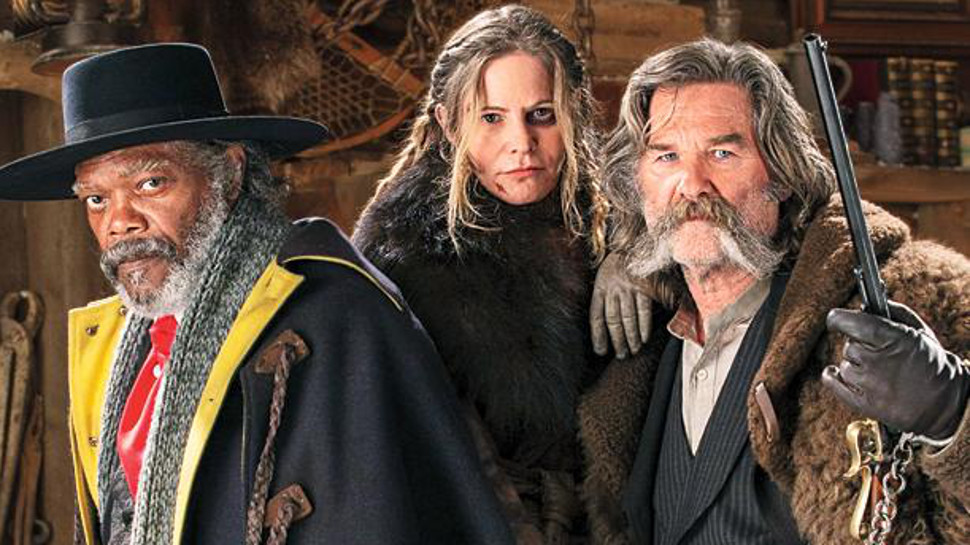
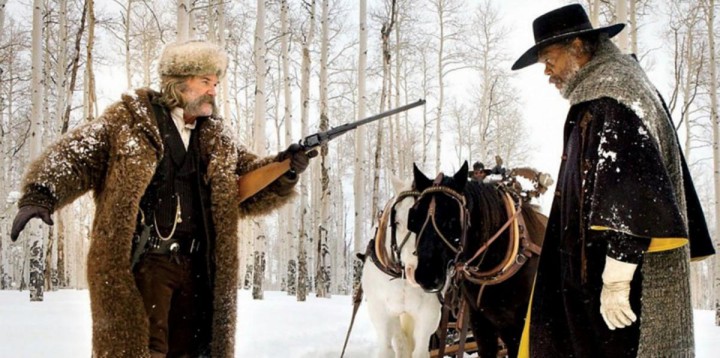
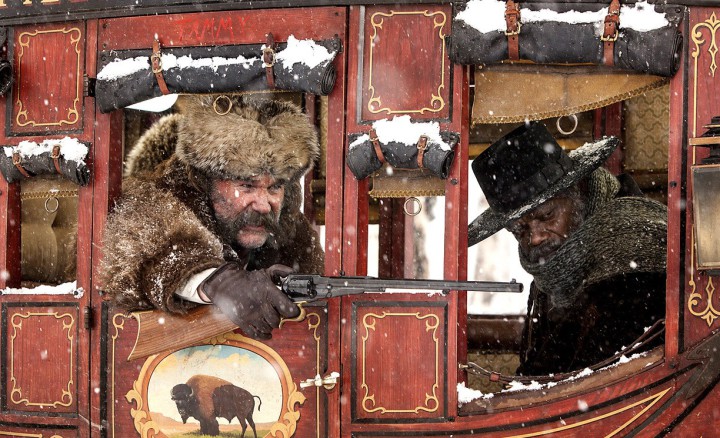
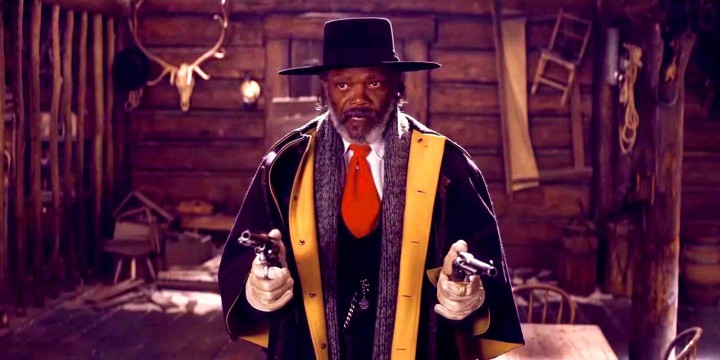
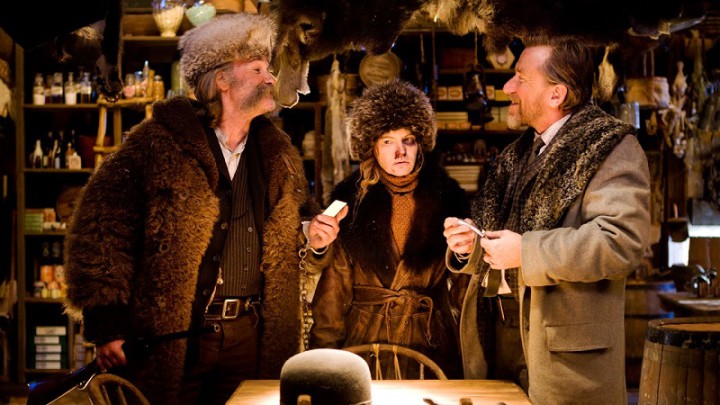
I loved this film too. I started watching it at 1:00 pm and was really tired, but the film was so interesting my sleep went away. Definitely one of my favorite films this year!
I really did not expect it to alter my Best of list, but it did.
I’ll be getting into SPOILER territory, so if you haven’t seen the film, stop reading.
I’ll ignore the concern of alleged racism and misogynistic – although I believe there’s certainly an argument to be made for the latter – and just get straight into what bothered me the most about this wankfest. Yes, this is not the kind of self indulgence I enjoy witnessing. Tarantino’s delves too far into his own interests that it ends up exploiting his worst tendencies.
To be specific, it’s the fifth chapter – the flashback one. It provides unneeded exposition that feels remarkably cruel, even for Tarantino (and only backs that misogyny criticism, but that’s not what this is about), and completely thwarts the much needed momentum it left us with. Okay, I’ll accept the fact that Tarantino wanted to fill us in on a few characters, even though he could have done this with (funnily enough) a few lines of dialogue. What bothers me is that this gap he fills in ends up making what we’re witnessing in the present entirely problematic. Certain character’s decisions now seem completely illogical. For a director that usually tight with his plotting, he’s surprisingly sloppy here. This misstep brings up two questions that nagged at me ever since the chapter occurred. Why did Tatum have to conduct such a convoluted scenario when he could have just, I don’t know, ambushed the stagecoach? I know, there wouldn’t be a movie, which brings me to my second question. Why didn’t these hateful four shoot on the spot? There was no need for them to draw out what occurred in that cabin, other than for Tarantino to have an excuse to indulge in a haphazard Christie plot and excessive cartoonish violence.
Not to mention the fact that this cut in chapters allows Tarantino to switch Jackson’s placement when chapter six occurs (there was no reason for him to be on that bed when Tatum was right below him.) It may seem like nitpicking, but when Tarantino wants to be thematically relevant and have a reason to depict Daisy the way he does, he needs a stronger excuse.
Thing is…none of that bothers me, but then I don’t think it’s a wankfest.
I honestly wouldn’t find it nearly as problematic (though my opinion would still be on the negative side) had he cut that chapter – and the Zombie-esque story Jackson tells.
This is why they make a variety of movies.
I normally like Channing Tatum, but he was miscast in this.
I don’t see that. but…
Yes, he was way off in this. Did not see the bad ass he was supposed to be.
I won’t say he’s miscast because I find him convincing in the part, but he was the least adept of the ensemble at making Tarantino’s dialogue sing.
I thought he was fine. It’s not like he had all that much to do.
Loved, loved, LOVED IT!! I will see it quite often in cinemas but sad I could not have seen the road show version. When people asked about Grindhouse I told them it was an “event” you had to see in a cinema to enjoy the whole package.
Much as I liked Planet Terror and the fake trailers, I hated Death Proof — with a passion. What a bore.
Hot women (oh, Rosario) talking about movies and muslce car action. What’s not to like?
The fact that it’s stupefyingly boring? (Sorry, but “muscle car” — aka: redneck sports cars — action does nothing for me.)
“I knew I should have read my horoscope this morning!”
Shavian wit.